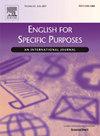Exploring the linguistic features of About Us texts on the official websites of international organizations: A corpus-based move analysis with multi-dimensional analysis
IF 2.7
1区 文学
Q1 LINGUISTICS
引用次数: 0
Abstract
Official websites serve as an important channel for international organizations to communicate with the public, and About Us (AU) pages, usually among the most frequently visited, provide basic information and act as a self-promotional platform to establish a positive institutional image. To explore the linguistic features of AU texts, this study combines a corpus-based move analysis with multi-dimensional analysis to examine the AU pages of 529 major international organizations. Thirteen moves are identified, with Moves 1, 3, 4, 8, 9, and 11 represent informational discourse focusing on conveying factual information, while the remaining moves express stance and evaluation as promotional discourse. Multi-dimensional analysis reveals that promotional and informational discourse differ significantly in Dimensions 1 and 4. Specifically, the strategic use of high-frequency nouns emerges as a key linguistic feature in constructing informational discourse, which also shows a marked avoidance of certain linguistic features such as analytic negation, stranded prepositions, and the pro-verb do. In contrast, promotional moves use more private verbs, first-person pronouns, and predicative adjectives to express evaluations, assessments, and stance. Modal verbs are also used to articulate organizational aspirations and future commitments.
国际组织官方网站“About Us”文本的语言特征探析——基于语料库的多维分析
官方网站是国际组织与公众沟通的重要渠道,而“关于我们”(About Us, AU)页面通常是最常访问的页面之一,它提供了基本信息,并作为一个自我宣传的平台,建立了一个积极的机构形象。为了探究非盟文本的语言特征,本研究将基于语料库的移动分析与多维分析相结合,对529个主要国际组织的非盟页面进行了研究。共有13步,其中第1、3、4、8、9和11步是侧重于传达事实性信息的信息性话语,其余的是表达立场和评价的促进性话语。多维分析表明,促销语篇和信息语篇在第1维度和第4维度上存在显著差异。具体来说,高频名词的策略性使用是构建信息语篇的一个关键语言特征,它也显示出对某些语言特征的明显回避,如分析否定、介词搁浅和亲动词do。相比之下,促销活动更多地使用私人动词、第一人称代词和谓语形容词来表达评价、评价和立场。情态动词也用于表达组织的愿望和未来的承诺。
本文章由计算机程序翻译,如有差异,请以英文原文为准。
求助全文
约1分钟内获得全文
求助全文
来源期刊

English for Specific Purposes
LINGUISTICS-
CiteScore
5.70
自引率
8.00%
发文量
41
审稿时长
62 days
期刊介绍:
English For Specific Purposes is an international peer-reviewed journal that welcomes submissions from across the world. Authors are encouraged to submit articles and research/discussion notes on topics relevant to the teaching and learning of discourse for specific communities: academic, occupational, or otherwise specialized. Topics such as the following may be treated from the perspective of English for specific purposes: second language acquisition in specialized contexts, needs assessment, curriculum development and evaluation, materials preparation, discourse analysis, descriptions of specialized varieties of English.
 求助内容:
求助内容: 应助结果提醒方式:
应助结果提醒方式:


